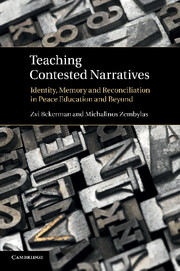Book contents
- Frontmatter
- Contents
- Acknowledgments
- Permissions
- Part I Introduction and theoretical underpinnings
- 1 Introduction
- 2 Problematizing peace education romanticism
- 3 On conflict, identity and more
- Part II Living and teaching contested narratives
- Part III Mourning, forgiveness and reconciliation
- Part IV Conclusions
- References
- Index
3 - On conflict, identity and more
Published online by Cambridge University Press: 05 December 2011
- Frontmatter
- Contents
- Acknowledgments
- Permissions
- Part I Introduction and theoretical underpinnings
- 1 Introduction
- 2 Problematizing peace education romanticism
- 3 On conflict, identity and more
- Part II Living and teaching contested narratives
- Part III Mourning, forgiveness and reconciliation
- Part IV Conclusions
- References
- Index
Summary
The purpose of this chapter is to delve into a theorization of the three major constructs that constitute the focus of this book: identity, memory and reconciliation. But we want first to sketch briefly the macro- and micro-theoretical perspectives of studying conflict. This brief overview will help us situate not only the theoretical ground of the constructs utilized in this book but also the context for the analysis of the teaching and learning events we have been studying.
Macro- and micro-theoretical perspectives of studying conflict
Conflicts are all around us and between us. Some we cope with rather easily; others become sources of very real trouble. In the context of this book we mean conflict associated with the allocation of resources, material or symbolic. In this sense we are speaking not only about this in the context of conflict and post-conflict societies – in the narrow sense of armed conflict – but also about all contexts in which the distribution of material and symbolic resources is unequal and creates marginalization and inequality; in this case the United States of America, for instance, would be an example too.
- Type
- Chapter
- Information
- Teaching Contested NarrativesIdentity, Memory and Reconciliation in Peace Education and Beyond, pp. 44 - 68Publisher: Cambridge University PressPrint publication year: 2011



